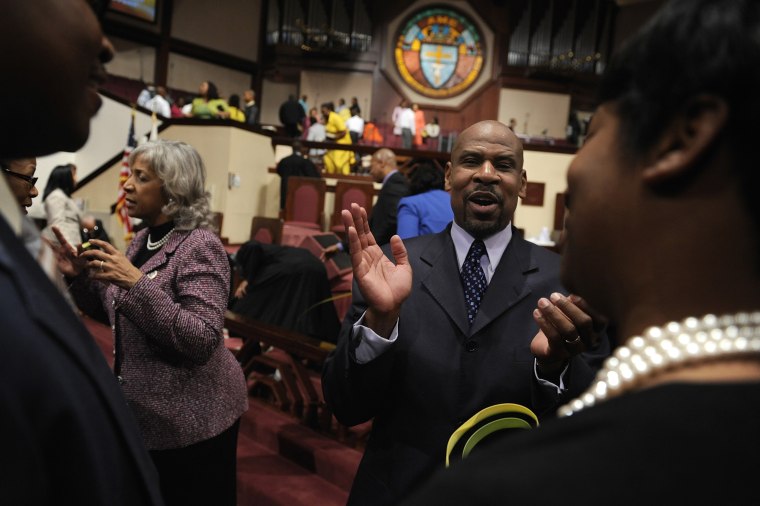By the time thousands of parishioners stream into the 3,000-seat Ebenezer AME Church on Easter Sunday, church leaders hope to have something else to celebrate: financial revival.
The congregation, one of America's largest, has been scrambling to raise funds to save the arena-sized sanctuary from potential foreclosure. To that end, it has enlisted national leaders, such as the Rev. Jesse Jackson and Harvard Law School's Charles Ogletree, who was President Barack Obama's law professor.
Thanks to its 10,000-member congregation and connections with business and civic leaders, Ebenezer expects to avoid the fate of a growing number of U.S. churches, which are defaulting on loans, facing foreclosure and even declaring bankruptcy at an unprecedented pace.
"It's happening to virtually every church," said the Rev. Grainger Browning, senior pastor of Ebenezer. "At a recent meeting with the 100 top pastors in the country, it was amazing how all of us were facing some sort of challenge with the banks."
Supercheap, few-questions-asked loans were a temptation even churches could not resist, but now they are paying for their mistakes as the debt crisis enters the house of God.
Long considered among the safest of borrowers, churches gambled on real estate at a time when credit copiously flowed and lenders were startlingly lax.
Dip in donations
But places of worship have since been battered by the economic downturn. Donations have dipped, investment returns have plunged and bank credit is still hard to come by.
"You build it and they will come. It really was true through the years," said Brad Hampton, executive pastor at the Faith Center of Rockford, Ill. "They like newness," he says of younger churchgoers.
Hampton's megachurch was erecting a new sanctuary that could seat almost 2,000 when his lender refused further credit beyond an initial $4.2 million. The Faith Center, which also has a 48,000-square-foot "life center" that operates various ministries, is being foreclosed upon.
"People call and say 'You're not alone'," Hampton said.
Getting a complete picture of the financial health of churches across the country is difficult. But a review of filings in the Thomson Reuters Westlaw legal database shows foreclosure proceedings against U.S. churches have nearly tripled since December 2007, when the recession began, compared with the previous seven years, which included the dot.com bust and economic downturn.
Court records also reveal more than 100 churches have declared bankruptcy in the last year, often in a last-ditch attempt to halt a sheriff's sale. That number could rise fast.
Fighting foreclosure
An investigation by a Memphis television station found hundreds of churches in the city fighting foreclosure. Jackson estimates thousands of African-American churches nationwide are in danger of foreclosure, with 200 in Atlanta alone.
Ebenezer AME got into trouble when its cash reserves fell below $750,000, tripping a covenant on its loan.
Its lender, Bank of America, initially insisted that the church hire a consultant, at a cost of $5,000 a day, to keep a watch on its finances, and required cuts to pastoral benefits such as a car allowance. The bank eventually dropped those demands, along with a plan to raise the interest rate on the church's $8.5 million mortgage, so long as Ebenezer AME found another lender to take over the loan.
Other lenders have been somewhat less forgiving. Court records show that JPMorgan Chase & Co. relied on a private investigator to compile evidence against Hopewell Baptist Church, which operates out of the former B'nai Jeshurun synagogue in Newark, N.J., and is the home of "kosher gospel" music.
The private investigator, according to the court documents, photographed the license plates of everyone who drove up, in an apparent attempt to determine if the church was operating and likely to be collecting rent.
The court ended the church's bankruptcy protection and it is slated for sheriff's sale in April.
Of course, things are not uniformly bleak. In the case of Ebenezer, the Maryland megachurch, its prayers may be answered. The church hopes to finalize a deal with a new lender, Industrial Bank of Washington, D.C., to take over the loan this week.
